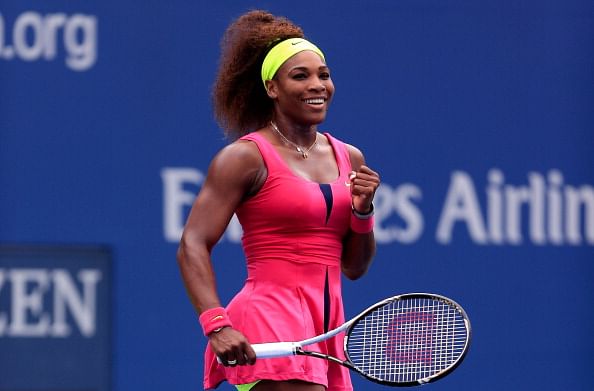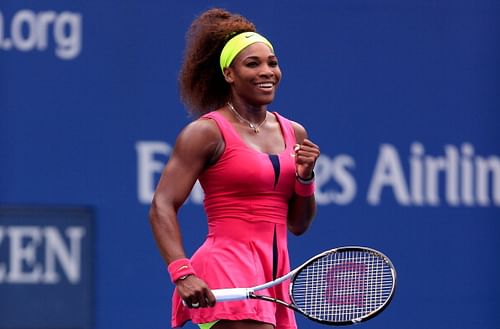
Serena Williams: The role model everyone wrongly warned you against

Turning the role model definition upside down
When it comes to choosing a role model, most of us have always been taught to look for the ‘nice’ guys. The ones who put kindness over ruthlessness, who showcase their largeness of heart more than the strength of their arms – these are the men and women who should inspire us. Oh, it’s a bonus if these magnanimous souls achieve a fair bit of success along the way, but that’s never the sole reason why we’re supposed to look up to someone.
But what of people who are so efficient, so ruthless, in their quest for perfection that they turn the whole process into an art? Should the people who yearn for success over everything else, but who also respect the rules – the ones who play hard but fair, in short – be brushed aside as unworthy of the common man’s admiration?
Serena Williams has spent the better part of two decades trying to change our perception of ‘role models’. And while I wouldn’t say she has been spectacularly successful in that, she has certainly redefined the boundaries of we’ve thought possible on the field of sport. To my mind, it is impossible not to be inspired by that.
Supremely confident right from the start
It all started in Compton, California, where Serena and elder sister Venus were stubbornly home-schooled and home-coached by their father Richard. The incredible talent within the two was only just beginning to come to the surface, and in 1990 the family moved to West Palm Beach, Florida to further their tennis development. Richard enrollled Venus and Serena at Rick Macci’s tennis academy, but he kept them away from the junior tennis circuit, partly because the sisters had been at the receiving end of racist undercurrents from some of their peers’ parents.
In 1992, when Serena was 11 and Venus was 12, an organization called Trans World Sport decided to interview the two prodigies, and the footage from that meeting has turned out to be amazingly prophetic. Take a look at the video, where Serena proclaims, even as a mild-mannered 11-year-old, that she wouldn’t want to be like anyone else when she grew up, but that she would want others to want to be like her.
How do you get that kind of self-belief? It’s certainly not something that is very common, even among world-class athletes. You’d have to hunt far and wide before you will come across an individual as supremely confident of his abilities as Serena was at 11.
Which makes sense, because you’d also have to hunt far and wide before you’ll find an athlete as ridiculously dominant as Serena. This has probably been said a few too many times, but Serena Williams at her best is so far above the competition that it doesn’t even seem fair. She may have won ‘only’ 18 Grand Slams and been No. 1 in the world for a much shorter time than Steffi Graf, but it’d be hard to find anyone who’d disagree with the notion that there has never been a tennis player – male or female – as dominant over his or her peers as Serena.
Rendering the competition meaningless
She may not be the greatest player of all time, but when she’s fully on her game, she is perhaps the only one in tennis history who can claim to be truly invincible.
But even that brilliant quality, that ability to soar far, far above the competition, has earned her brickbats over the years. I’ve actually heard some people say – and I’m not making this up – that since she is so much stronger and quicker than her opponents, she should not be allowed to compete on the tour.
This, of course, is in addition to the customary racist remarks and insults about her appearance, her supposed lack of feminity, and her general cussedness.
While the racist comments are too despicable to even merit a response – whether from her or her fans – I think it’s pertinent to give some thought to the first argument. Is Serena really that physically superior to the rest of the field that she renders the competition meaningless?
The real difference maker – mental strength
The stats would tell a different story. Serena is known to have the greatest serve in the history of women’s tennis, but she certainly isn’t the biggest server. Her sister as well as Germany’s Sabine Lisicki have been clocked at higher serving speeds than Serena. The younger Williams isn’t the most powerful off the ground either – both Maria Sharapova and Petra Kvitova have quicker groundstrokes on record.
As for movement around the court, I think even a casual fan will agree that while Serena is quick, she is not quite in the same league as Justine Henin or Jelena Jankovic when it comes to pure foot speed.
It’s not quite an open-and-shut case, but there may be a strong argument that Serena isn’t actually physically superior to all her opponents. The vast difference between her and the field, then, has to be down to something else. And it’s not rocket science to figure out what that is – it’s the stuff between the ears.
Serena’s success has had more to do with her unshakeable temperament than her admittedly impressive physical attributes. How many times have we seen her come back from a seeming impossible situation and win a match, just because she refused to admit defeat? The woman has won as many as three Grand Slams after saving match point, which is the most by any player in tennis history – male or female. That tells you everything you need to know about her astounding mental strength.
Is ego really all that bad?
Of course, Serena’s ego plays a fairly big part in her success too. She genuinely believes she is better than everyone else; she gets mad when she loses because she simply can’t forgive herself for taking her foot off the pedal.
Sure, that kind of behaviour may sound unsportsmanlike to many, and Serena certainly has done some damage to her image by occasionally refusing to give credit to her opponents. But the attitude has also helped her; if you know you are the best, it’s only a matter of time before that truth becomes manifest on the field too.
Serena’s ego is possibly the biggest reason why she enjoys such a terrifying stranglehold over Maria Sharapova today. 10 years ago a 17-year-old Sharapova stunned Serena in the Wimbledon final, and Serena has never forgiven that. What’s more striking, though, is that every time she takes the court against the Russian, she makes the whole world know exactly how outraged she still is that she lost that match.
Serena plays with considerably more focus every time she and Sharapova play each other; the American’s face almost seems to be screaming: “How dare you defeat me in a Grand Slam final!” And she walks the talk too: Serena leads Sharapova 16-2 in their head-to-head, giving new meaning to the term ‘lopsided’.
The good side of wanting to win at all costs
We’ve been taught that the desire to seek vengeance is a sin, that revenge is the bane of all things good about competitive sport. But what if that revenge is extracted by the purest means possible – by the attainment of athletic perfection? I don’t know about you, but when I see Serena Williams belt the ball with a ferocity that can never be equalled, I believe that she takes sport to heights beyond the reach of ordinary mortals.
Over the course of nearly 20 years playing tennis, Serena Williams has played hard but fair, obliterated her opponents but stuck to the rules, and displayed athletic excellence but maintained her sportsmanship (save for that one isolated incident at the 2009 US Open). She has also frequently fought off racism (not just in Compton; from her fellow players too), batantly biased umpiring (which led to the introduction of Hawk-eye) and vicious, derogatory comments from the people who call themselves fans of the sport.
Through all of that, she has maintained her composure, stuck to her guns, and kept winning. And to me, that is a career worth taking inspiration from, irrespective of how many people she has unintentionally rubbed wrong along the way.
Sport is about winning just as much as it is about being nice, and credit Serena for reminding us that day in and day out.